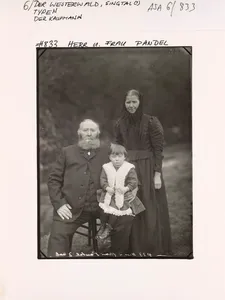The problem with this whole scheme is that Julian Sanders does not actually control the Sander estate — it was sold in 1992 by Gerd Sander (August's grandson, and Julian's father) to the Cultural Foundation of the Stadtsparkasse Cologne. That group was surprised to see all of Sander's work suddenly being sold as NFTs without their permission, and submitted a legal notice to have it taken down from OpenSea. OpenSea complied with the request on March 7. After almost two weeks of stalling and deflecting questions about the delisting without even acknowledging the cause, Fellowship and Julian Sander finally released a statement on the issue on March 18. Sander wrote that "a third party... claims to have certain rights in August Sanders' photographs" but that he "believe[s] the complaint is not valid" and would be working with his lawyers to have the collection reinstated. As best as I can tell, it seems that Sander is trying to argue he is entitled to sell his great-grandfather's work as NFTs because he physically possesses the negatives, despite the fact that the Cultural Foundation owns the usage rights to all of Sander's work.
Over 10,000 NFTs of photographs by August Sander are delisted from OpenSea after being created without permission
An NFT project called the August Sander 10K Collection launched on February 11, offering NFTs of all 10,700 photographs by German portrait and documentary photographer August Sander (1876–1964). The project website described a "groundbreaking partnership between Fellowship and the August Sander family estate", apparently referring to their partnership with August Sander's great-grandson Julian. The NFTs were all distributed for free to the Fellowship community, which the project website boasted "speaks volumes about the commitment of both Fellowship and the August Sander family estate to creating a new standard of visibility and public access to large photography collections, an issue that has historically burdened museums". The website does not appear to mention that they take a 10% cut of all secondary sales, which so far appears to have netted them around 7 ETH ($20,000).

